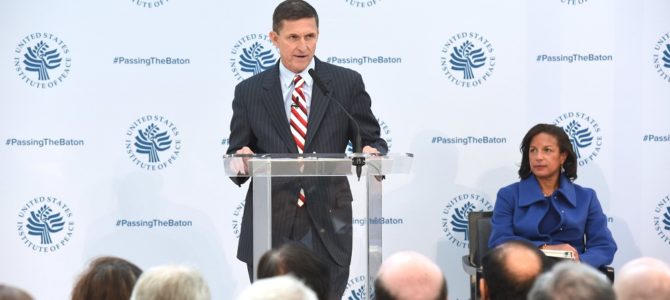
Late on May 12, the federal judge presiding over the Michael Flynn criminal case entered a short order announcing to the world his intent to accept outside briefing on the Department of Justice’s motion to dismiss the charges against Flynn with prejudice. Absent reconsideration or reversal of that order, Judge Emmet Sullivan has just ensured that the Russia collusion hoax will be relitigated on the federal docket.
While Flynn’s connection to the broader Russia conspiracy theory was tangential, he was caught up in the plot to take down the president when FBI agents discovered he had spoken with the Russian ambassador in late December 2016. Realizing they could use the Russia collusion investigation as a pretext to quiz Flynn on this conversation, FBI Agent Peter Strzok intercepted the documents closing the investigation into Flynn, then led a casual chat with Flynn, designed to trip up the newly named Trump national security advisor.
The ploy worked, and Flynn’s responses to the Strzok’s questioning served as a sufficient predicate for a charge of making false statements to government officials under Section 1001. Flynn later pleaded guilty in late 2017 to the charge that he lied to the FBI concerning his conversations with the Russian ambassador. Shortly after Flynn entered his guilty plea, the case was transferred to Judge Sullivan. A year later, the retired lieutenant general appeared before Judge Sullivan for sentencing.
After Judge Sullivan suggested Flynn might receive some jail time if sentencing proceeded—even though federal prosecutors recommended against a prison sentence—Flynn requested a delay to allow him to cooperate with Special Counsel Robert Mueller’s office. Flynn continued to cooperate with Mueller’s team for the next six months and then, after the special counsel’s office disbanded, he fired his Covington and Burling attorneys and replaced them with Sidney Powell.
Powell requested several continuances of sentencing to allow her to review the files Flynn’s former attorneys began to transfer. Powell then filed several motions seeking to compel the government to produce exculpatory evidence improperly withheld from Flynn, and later requesting dismissal of the charge against Flynn for outrageous prosecutorial misconduct.
In a nearly 100-page opinion, Judge Sullivan shot down every one of Powell’s requests for evidence. Powell then pushed for Flynn to be allowed to withdraw his guilty plea, arguing the government breached its plea agreement with her client and that Flynn’s Covington and Burling attorneys had a conflict of interest and had provided ineffective assistance of counsel. Powell also stressed that Flynn was innocent of the charge and had pleaded guilty only because federal prosecutors threatened to go after his son if he did not plead guilty.
Before Judge Sullivan could rule on Flynn’s motions to withdraw his guilty plea, a trove of newly declassified documents supporting Flynn’s arguments became public. Powell filed these documents with the court, including text messages and handwritten notes suggesting the FBI’s questioning of Flynn was really a perjury trap.
Then came the next shocker: The U.S. attorney filed a motion to dismiss the charge against Flynn with prejudice—meaning he cannot be tried again. In the government’s 20-page motion, federal prosecutors explained that, “after a considered review of all the facts and circumstances of this case, including newly discovered and disclosed information,” the government believed it could not establish the elements of the offense beyond a reasonable doubt.
The motion then laid out evidence indicating that Flynn had not lied to FBI agents Strzok and Joe Pientka, and that the 302 summaries of Flynn’s interview had been wordsmithed to create the impression he had. Federal prosecutors also detailed their view that Flynn’s statements to the FBI agents, even if false, were not material to any legitimate investigation and thus could not form the basis for a Section 1001 prosecution.
Because Flynn had already pleaded guilty to the offense, Judge Sullivan needed to grant the government’s motion to dismiss the charge before the criminal case could end. Instead, however, Judge Sullivan shocked everyone yesterday afternoon by entering an order allowing outside parties to file “amicus curiae” or “friend of the court” briefs.
“An amicus brief should normally be allowed when a party is not represented competently or is not represented at all,” Judge Sullivan wrote, concluding that “at the appropriate time, the Court will enter a Scheduling Order governing the submission of any amicus curiae briefs”
Instantaneously, a group of attorneys, self-styled the Watergate Prosecutors, filed a notice of an intent to file an amicus brief. Flynn’s attorney responded by both objecting to the Watergate Prosecutors’ notice, and to the court’s broader decision to accept amicus curiae briefs in a criminal case.
It seems likely the Department of Justice will also object to the court’s apparent solicitation of amicus curiae briefs in a criminal case, given that the executive branch holds the sole constitutional authority to determine whether to prosecute a case. It seems equally likely that Judge Sullivan won’t change his mind about his order. However, once the flurry of politically charged briefing starts, the long-time federal judge may find himself regretting his decision.









